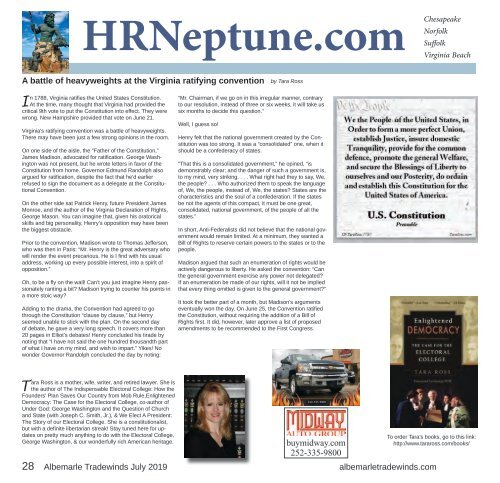Albemarle Tradewinds July 2019 Web Final
July Edition Now Online.
July Edition Now Online.
Create successful ePaper yourself
Turn your PDF publications into a flip-book with our unique Google optimized e-Paper software.
HRNeptune.com<br />
<br />
<br />
<br />
<br />
A battle of heavyweights at the Virginia ratifying convention<br />
by Tara Ross<br />
In 1788, Virginia ratifies the United States Constitution.<br />
At the time, many thought that Virginia had provided the<br />
critical 9th vote to put the Constitution into effect. They were<br />
wrong. New Hampshire provided that vote on June 21.<br />
Virginia’s ratifying convention was a battle of heavyweights.<br />
There may have been just a few strong opinions in the room.<br />
On one side of the aisle, the “Father of the Constitution,”<br />
James Madison, advocated for ratification. George Washington<br />
was not present, but he wrote letters in favor of the<br />
Constitution from home. Governor Edmund Randolph also<br />
argued for ratification, despite the fact that he’d earlier<br />
refused to sign the document as a delegate at the Constitutional<br />
Convention.<br />
On the other side sat Patrick Henry, future President James<br />
Monroe, and the author of the Virginia Declaration of Rights,<br />
George Mason. You can imagine that, given his oratorical<br />
skills and big personality, Henry’s opposition may have been<br />
the biggest obstacle.<br />
Prior to the convention, Madison wrote to Thomas Jefferson,<br />
who was then in Paris: “Mr. Henry is the great adversary who<br />
will render the event precarious. He is I find with his usual<br />
address, working up every possible interest, into a spirit of<br />
opposition.”<br />
Oh, to be a fly on the wall! Can’t you just imagine Henry passionately<br />
ranting a bit? Madison trying to counter his points in<br />
a more stoic way?<br />
Adding to the drama, the Convention had agreed to go<br />
through the Constitution “clause by clause,” but Henry<br />
seemed unable to stick with the plan. On the second day<br />
of debate, he gave a very long speech. It covers more than<br />
20 pages in Elliot’s debates! Henry concluded his tirade by<br />
noting that “I have not said the one hundred thousandth part<br />
of what I have on my mind, and wish to impart.” Yikes! No<br />
wonder Governor Randolph concluded the day by noting:<br />
“Mr. Chairman, if we go on in this irregular manner, contrary<br />
to our resolution, instead of three or six weeks, it will take us<br />
six months to decide this question.”<br />
Well, I guess so!<br />
Henry felt that the national government created by the Constitution<br />
was too strong. It was a “consolidated” one, when it<br />
should be a confederacy of states.<br />
“That this is a consolidated government,” he opined, “is<br />
demonstrably clear; and the danger of such a government is,<br />
to my mind, very striking. . . . What right had they to say, We,<br />
the people? . . . Who authorized them to speak the language<br />
of, We, the people, instead of, We, the states? States are the<br />
characteristics and the soul of a confederation. If the states<br />
be not the agents of this compact, it must be one great,<br />
consolidated, national government, of the people of all the<br />
states.”<br />
In short, Anti-Federalists did not believe that the national government<br />
would remain limited. At a minimum, they wanted a<br />
Bill of Rights to reserve certain powers to the states or to the<br />
people.<br />
Madison argued that such an enumeration of rights would be<br />
actively dangerous to liberty. He asked the convention: “Can<br />
the general government exercise any power not delegated?<br />
If an enumeration be made of our rights, will it not be implied<br />
that every thing omitted is given to the general government?”<br />
It took the better part of a month, but Madison’s arguments<br />
eventually won the day. On June 25, the Convention ratified<br />
the Constitution, without requiring the addition of a Bill of<br />
Rights first. It did, however, later approve a list of proposed<br />
amendments to be recommended to the First Congress.<br />
Tara Ross is a mother, wife, writer, and retired lawyer. She is<br />
the author of The Indispensable Electoral College: How the<br />
Founders’ Plan Saves Our Country from Mob Rule,Enlightened<br />
Democracy: The Case for the Electoral College, co-author of<br />
Under God: George Washington and the Question of Church<br />
and State (with Joseph C. Smith, Jr.), & We Elect A President:<br />
The Story of our Electoral College. She is a constitutionalist,<br />
but with a definite libertarian streak! Stay tuned here for updates<br />
on pretty much anything to do with the Electoral College,<br />
George Washington, & our wonderfully rich American heritage.<br />
buymidway.com<br />
252-335-9800<br />
To order Tara’s books, go to this link:<br />
http://www.taraross.com/books/<br />
28 <strong>Albemarle</strong> <strong>Tradewinds</strong> <strong>July</strong> <strong>2019</strong> albemarletradewinds.com

















